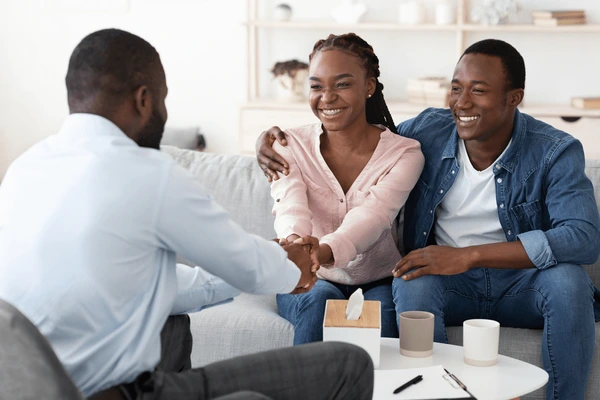Relationship
Some communication games for couples to grow closer

Maintain effective communication
Two truths and a lie
Looking for communication games to get to know your partner better?
To play two truths and a lie, your partner and you will take turns sharing one false and two things that are true about you. The other needs to guess which is a lie. Communication games are a great opportunity to learn more about each other.
Answer the famous 36 questions
Perhaps you want a couples question game?
The famous 36 questions were created in a study exploring how intimacy is built. Communication is the key component of it since we grow fond of each other when we share. As you move through the questions, they become more personal and profound. Take turns, answering them, and observe how your understanding grows with each one.
The game of truth
If you need simple yet effective communication games for couples, try the game of truth. All you need to do is ask your partner questions and answer his/her questions honestly. You can play with the topics of the game going from light (such as favorites movie, book, childhood crush) to more heavy (such as fears, hopes, and dreams). Some questions to consider:
What’s your biggest fear?
If you had a magic wand, what would you use it for?
What is your favorite childhood memory?
What book had a transformational power for you?
What would you improve in our communication?
The 7 breath-forehead connection
Communication games for couples can inspire you to be more in sync with your partner and pick up on non-verbal cues better.
To play this game, you need to lie down next to each other and gently put your foreheads together. While you look into each other’s eyes, stay in this position for at least 7 breaths or more. This game increases a sense of connection and non-verbal understanding.
This or that
If you need communication games to get to know your partner better, especially early in the relationship, here is a fun game. Simply ask for their preference between two choices. Don’t forget to ask why they chose something. Some questions to get you started:
TV or books?
Indoors or outdoors?
Save or spend?
Lust or love?
Forgotten Or Remembered For All The Wrong Reasons?
How well do you know me?
Some communication games meant for parties can be adapted for you two. To play this game, you need to think of different categories and questions (for example, favorite movie, best vacation, favorite color). Both partners will answer the questions for themselves (write on one piece of paper) and their loved ones (use a different piece).
The answers are compared in the end to see what correct answers about the other person you had. To make it more fun, have a wager who will guess more and household chores can be the currency.
To be continued…
Relationship
What you should expect to learn in pre-marital counselling

- Pre-marital counselling involves couples coming together for joint therapy sessions
Many times, pre-marital counselling involves couples or partners coming together for joint therapy sessions. Working with a qualified marriage counsellor or therapist, you will learn skills to help improve your relationship as a couple.
At the same time, it is not all pre-marital counselling that leads to marriage. It is possible that certain discoveries (and major red flags) could emerge during the counselling sessions, and for that reason one of you may want to discontinue the marriage process so as to avoid any future regrets.
From my experience and professional practice, I would say that no matter how painful it is to break up a relationship prior to marriage; it is still far better to do that than to break up your marriage relationship.
The marriage breakup has more serious implications than any pain that could emerge from relationship break up.
In some instances, the specific topics to be explored and skills to be developed in your pre-marital counselling sessions will depend on your needs as a couple.
Despite this, I would give you all the topics and skills to expect your counsellor to take you through in order to have a happy and lasting relationship.
Even if you are not considering pre-marital counselling at the moment, you can still benefit from these skills and topics. They are also an excellent way to create depth in your conversations and build a solid healthy foundation in the early stages of your relationship.
Not in any specific order, I would like you to take note of these important skills and lessons you will learn in your sessions: 1 understanding the concept of marriage, 2 building a strong foundation for your marriage, 3 examining your expectations leading to your marriage, 4 undergoing medical tests and sometimes mental health assessment, 5 resolving conflicts together, 6 communicating openly and effectively, 7 taking decisions as a couple, 8. building a strong Christian home (if you’re Christians), 9 building transparency and trust, 10 knowing yourselves: your strengths and weaknesses—and how to improve them, 11 building commitment towards the marriage and each other, 12 accepting your unique roles and responsibilities in your marriage, 13 planning your future together, 14 sexual intimacy in marriage, 15 bearing and raising children, 16 understanding the concept of love, 17 the role of love languages in experiencing marital happiness, 18 managing your home finances, 19 defining your beliefs and values, 20 adjustments in marriage, 21 balancing love, work, and family life, 22 relating with your in-laws and third parties, 23 creating your unique marriage and family rituals, 24 engaging married couples to learn from them, 25 understanding divorce and what causes it, 26 Christian view on divorce, 27 preparing for your marriage ceremony, 28 planning for your honeymoon and how to maximise it, and finally, 29 making your first year of marriage count.
To be continued …
Source: Excerpts from ‘Preparing for a Happy and Fulfilling Marriage’ Book by REV. COUNSELOR PRINCE OFFEI (Psychotherapist and Marriage Therapist). https://counselorprinceass.wixsite.com/edu-counseling-psych
https://princeoffei22.wixsite. com/website-psychologist
https://princeoffei22.wixsite. com/website
COUNSELOR PRINCE & ASSOCIATES CONSULT (CPAC COUNSELLOR TRAINING INSTITUTE)
Relationship
Tips for creating healthy working relationships
We spend around a third of our lives at work. Our jobs and careers make a real impact on our overall levels of happiness. Having good work relationships will always make our jobs more enjoyable
Also, when we have great workplace relationships we will demonstrate cooperation, trust and fairness, activating the reward centre of our brains which encourages even more positive interactions.
Here are some tips to create healthy relationships at the workplace.
1. Focus on self-awareness
This means taking full responsibility for your words and actions, not letting your own negative emotions impact the people around us.
If you feel frustration or resentment towards others this will manifest in what you observe and the way you engage.
By developing your own Emotional Intelligence, you will become more adept at identifying and handling your emotions be able to recognise the needs of others.
Again, if you view colleagues with compassion and respect, you will improve your interactions and build strong working relationships.
What would happen if you stopped making judgments and embraced a positive appraisal of your co-workers? If we saw difference as something valuable that could be harnessed and actually enhance your perception and understanding of those around you? Your vibe will always attract your tribe.
2. Be open and honest
A good relationships depend on open, honest communication. Whether you are sending emails or meeting face-to-face or on video calls, the more effectively you communicate with those around you, the better you will connect. It is important to identify the nature of your relationships with others.
What is it that we need and what do our colleagues need from us? Once you know the fundamentals of what you need you can be clear with communicating and better understanding each other’s requirements.
3. Practice active listening
Good people skills are essential. How good are you at collaborating, communicating and managing challenge? People respond better to those who truly listen to what they have to say. By practicing active listening, you will talk less and understand colleagues more and you will quickly become trustworthy and have more successful interactions.
One key skill you can forget when listening is the power of a good question. Active listening is engaging in what you hear, asking questions such as ‘What would you like to happen?’ How can I help you address that? Shows you listen and you care.
4. Avoid bad people skills
Good people skills mean avoiding the bad people skills. Gossip and negativity can ruin any workplace relationships. If you are experiencing challenge with someone in your group, talk to them directly and kindly about the problem, be prepared to listen attentively and objectively.
Gossiping or colluding with other colleagues will only aggravate the issues, accelerating mistrust and animosity.
5. Give praise and feedback
Everyone wants to feel that their work is appreciated and to feel truly valued. Genuinely complimenting the work and actions of those around you is a great way to build relationships.
Be honest, precise and authentic when delivering praise. Thank you or a gentle word of encouragement can make all the difference to someone’s day. These positive interactions can have a ripple effect and create a much happier and more successful workplace







